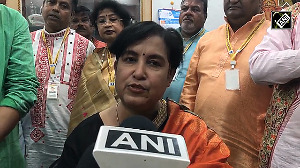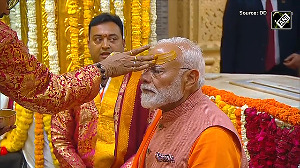During the tumultuous decades stretching from the 1960s to the 1980s, when the first two words that children born in working class Bangali families learned were 'Lal Salaam' and young revolutionaries with impeccable petit bourgeois upbringing breathlessly waited for the Red Army to arrive in Kolkata, one slogan that drowned out all other Marxist jabber was 'Congress'er kaalo haath bhengey daao, guriye daao (Break and crush the Congress' black hand).'
This one slogan, and not Marxist-Leninist dialectical materialism, raised by those in the vanguard of the proletarian revolution whose predominant banner was blood red and embossed with a sickle, a hammer and a star, together the symbol of the imminent coming to power of the un-empowered working class and disinherited peasantry, swayed the people of West Bengal away from the Congress and towards the Left, bringing the Communist Party of India-Marxist and its sundry allies to power where they have remained for the past two decades and more.
Who else but the Supreme Court
Meanwhile, the revolution that seemed just round the corner in the 1960s and 1970s became a distant dream by the close of the 1980s. The Red Army has stayed put in Beijing or wherever its foot soldiers are garrisoned. The young revolutionaries of the 'hungry generation', well past middle age, are a defeated lot with balding heads and spreading waistlines. Those in the vanguard of the proletarian revolution are leading lights of West Bengal's neo-compradour bourgeoisie. The first words their children lisp are lyrics picked up from MTV.
It is, therefore, not surprising that today's Marxists eagerly clutch the 'black hand' of the Congress, much like desperate lovers scared of being dumped the morning after, and prop up a Congress-led United Progressive Alliance government at the Centre whose right-wing policies militate against the left-wing 'progressive' agenda that the CPI-M and its partners continue to flaunt, frozen in time and space.
Nor is it surprising that given the Left's unquestioning support, but for which Sonia Gandhi would not have become more powerful than the prime minister of India, it should feel extremely upset that the Congress has left it in a lurch, looking utterly silly, more so Lok Sabha Speaker Somnath Chatterjee who now finds himself waging a lonely battle against the judiciary after remaining a silent spectator to the demeaning of the legislature in Jharkhand.
A charitable explanation for Chatterjee's disquiet over the Supreme Court's interim order putting an end to the fraud on the Constitution that was being brazenly perpetrated by the governor and UPA in Jharkhand could be that he is genuinely concerned about the transgression of the judiciary into an area over which it has no jurisdiction. But such is the plight of a discredited Left today, that benign explanations will be immediately denounced as naïveté; cynics will go a step forward and impute motives.
SC disposes Arjun Munda's petition
After all, Chatterjee is a senior advocate who presumably knows the law better than most politicians; that he should have overlooked the facts of the case before pronouncing his judgment does seem odd. The Supreme Court, responding to the petition filed by Arjun Munda, has merely undone the fraud committed by the governor of Jharkhand in not inviting the largest single party or largest pre-poll alliance to form the government, and then compounding that fraud by trying to facilitate horse-trading by the illegitimate JMM-Congress government installed by him.
The Supreme Court's direction that an Anglo-Indian member should not be nominated till the vote of confidence takes place, that the vote should take place without delay and that proceedings should be recorded as evidence, does not in any manner impinge on the rights of the Speaker, nor does it amount to the judiciary transgressing into an area that is the exclusive preserve of the legislature.
Throughout the entire week following the Congress attempt to subvert democracy in Jharkhand -- which came on the heels of its making a mockery of democratic norms and legislative procedures in Goa with the expedient purpose of dislodging the BJP from power and installing its own puppet regime -- Chatterjee tried his best to silence the Opposition in the Lok Sabha.
At one stage, when agitated members of the National Democratic Alliance had gathered in the well of the House, he was heard saying, 'Our democracy is being challenged. Our democracy is under threat.' No, not from Syed Sibtey Razi, the Congress stooge who occupies the Raj Bhavan in Ranchi; neither from subverts of the democratic process like Priya Ranjan Das Munshi and Ajit Jogi who, in tandem with their political bosses, supervised the fraud on the Constitution.
The 'challenge' and the 'threat' to democracy, as perceived by Chatterjee, was from those protesting against the murder of democracy!
And when the Supreme Court stepped into undo this massive fraud, he made it into an issue of undesirable conflict between the judiciary and the legislature, one that merited the UPA government seeking a Presidential reference.
Those who swear by Chatterjee's integrity will be quick to point out that if he were indeed seeking to help the Congress in its power grab, then Sonia Gandhi would not have left him high and dry. The Congress did play along with Chatterjee at the all-party meeting he had called to press his point about legislative independence and the need for seeking a Presidential reference.
But good sense and wisdom prevailed over those in the Congress spoiling for a confrontation with the judiciary and the idea of a Presidential reference was given a quiet burial. And not without reason: A reluctant President unwilling to forward a partisan reference could have destroyed whatever was left of the halo that once hovered over the head of the party's sainted leader and had taken a severe bashing after she tried to force her will over that of the people of Goa and Jharkhand.
Moreover, it is doubtful if key UPA allies like the DMK would have endorsed such perverse retaliation.
The CPI-M is honour bound to provide company to Chatterjee in his hour of loneliness, but that is cold comfort at best. The Speaker's Marxist comrades are reluctant to let go of the Congress' 'black hand' and it is a tough call for them. Refusing to accept the Speaker's demand for a Presidential reference is part of the Congress' damage control exercise. The CPI-M cannot but be a partner in that endeavour.
If that leaves no defenders for Chatterjee, well, such is politics; it is the price you pay for tenderly holding the 'black hand' that you once wanted to destroy with ferocious revolutionary fury.






 © 2025
© 2025